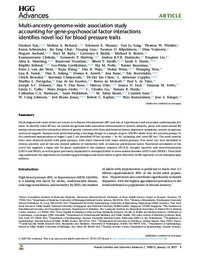Multi-ancestry genome-wide association study accounting for gene-psychosocial factor interactions identifies novel loci for blood pressure traits

Files
Self archived version
published versionDate
2021Author(s)
Unique identifier
10.1016/j.xhgg.2020.100013Metadata
Show full item recordMore information
Self-archived item
Citation
Sun, Daokun. Richard, Melissa A.. Musani, Solomon K.. Sung, Yun Ju. Winkler, Thomas W.. Schwander, Karen. Chai, Jin Fang. Guo, Xiuqing. Kilpeläinen, Tuomas O.. Vojinovic, Dina. Aschard, Hugues. Bartz, Traci M.. Bielak, Lawrence F.. Brown, Michael R.. Chitrala, Kumaraswamy. Hartwig, Fernando P.. Horimoto, Andrea R.V.R.. Liu, Yongmei. Manning, Alisa K.. Noordam, Raymond et al. [incl. Heikkinen, Sami. Lakka, Timo]. (2021). Multi-ancestry genome-wide association study accounting for gene-psychosocial factor interactions identifies novel loci for blood pressure traits. Human Genetics and Genomics Advances, 2 (1) , 100013. 10.1016/j.xhgg.2020.100013.Rights
Abstract
Psychological and social factors are known to influence blood pressure (BP) and risk of hypertension and associated cardiovascular diseases. To identify novel BP loci, we carried out genome-wide association meta-analyses of systolic, diastolic, pulse, and mean arterial BP, taking into account the interaction effects of genetic variants with three psychosocial factors: depressive symptoms, anxiety symptoms, and social support. Analyses were performed using a two-stage design in a sample of up to 128,894 adults from five ancestry groups. In the combined meta-analyses of stages 1 and 2, we identified 59 loci (p value < 5e−8), including nine novel BP loci. The novel associations were observed mostly with pulse pressure, with fewer observed with mean arterial pressure. Five novel loci were identified in African ancestry, and all but one showed patterns of interaction with at least one psychosocial factor. Functional annotation of the novel loci supports a major role for genes implicated in the immune response (PLCL2), synaptic function and neurotransmission (LIN7A and PFIA2), as well as genes previously implicated in neuropsychiatric or stress-related disorders (FSTL5 and CHODL). These findings underscore the importance of considering psychological and social factors in gene discovery for BP, especially in non-European populations.
Keywords
Link to the original item
http://dx.doi.org/10.1016/j.xhgg.2020.100013Publisher
Elsevier BVCollections
- Terveystieteiden tiedekunta [1793]


